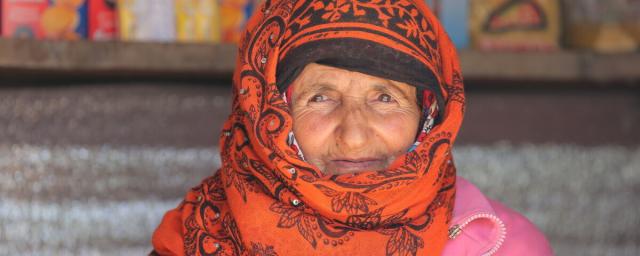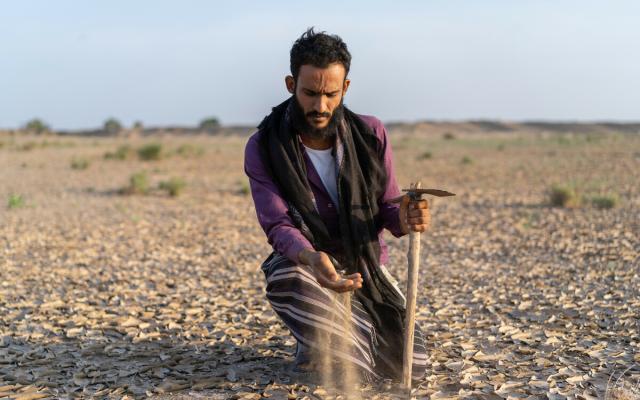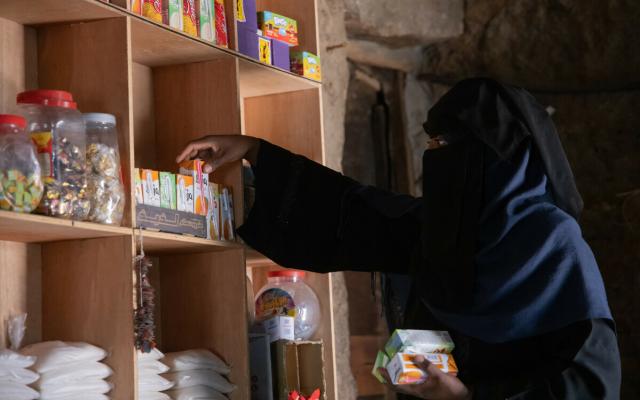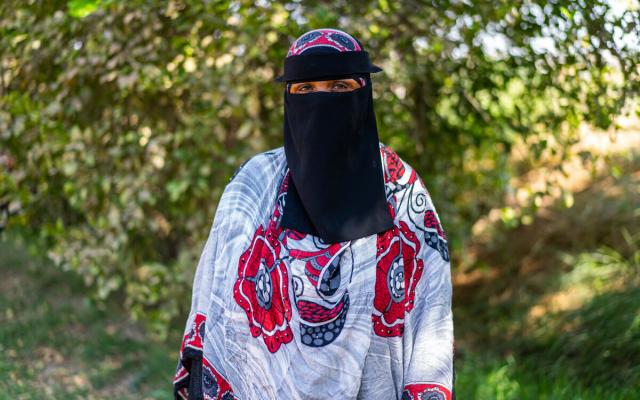
Razigah is a grocer and mother of seven. Oxfam supported Razigah after her husband died and she went bankrupt by giving her a cash grant to improve her business. (Photo: Kaff Media/Oxfam)
Yemen, the second largest country on the Arabian Peninsula, faces one of the world’s most severe humanitarian crises. Years of conflict have devastated Yemen’s economy and infrastructure, leading to widespread poverty, food insecurity, and a lack of essential services. Oxfam is responding with life-saving assistance and initiatives that strengthen civil society.

Bakeel Jahes holds the sand in his hand from the desertificated soil underneath him. Jahes’s family lost almost 60% of their land in Al-Wahat city, Lahj governorate, to desertification, floods, and war. (Photo: Gabreez/Oxfam)
Challenges
Yemen’s ongoing conflict has resulted in significant challenges. The country grapples with acute food insecurity, with over 17 million people prevented from meeting their basic nutritional needs. Access to clean water and sanitation remains limited, exacerbating health risks, particularly among marginalized groups. Economic instability, driven by competition between rival central banks, further complicates recovery efforts.
However, opportunities exist for rebuilding through local engagement and capacity-strengthening initiatives. Strengthening civil society organizations and fostering inclusive governance can pave the way for sustainable progress.
Impact on People
The ongoing crisis disproportionately affects women, children, and marginalized groups such as the Muhamasheen community. Women and girls face heightened risks of gender-based violence and limited access to education and healthcare. Displaced families struggle to secure basic necessities, while those with disabilities face poor access to services.

Oqba Abdullah arranges various items on the shelves, maintaining an orderly and well-stocked store. This is part of a broader effort by Oxfam and partner Tamdeen Youth Foundation (TYF) to support vulnerable families in conflict-affected areas of Yemen. (Photo: Ahmed Albasha for Gabreez/Oxfam)
Oxfam’s Role
Oxfam started operations in Yemen in 1983. Our priorities now include providing life-saving assistance, promoting rights, and enhancing local groups to respond to emergencies. We continue to play a critical role in addressing the crisis by focusing on gender justice, community resilience, and local partnerships. By advocating for inclusive policies and supporting initiatives, we aim to create lasting improvements in Yemen.

Arwa Ali Ahmed Nabit, a farmer from Al-Khaddad area in Lahj Governorate, Yemen, has emerged as a beacon of hope for the farmers in her region. Despite facing numerous challenges, such as drought, war, and floods, Arwa took it upon herself to restore greenery and life to the barren lands. Her dedication and efforts have transformed the lives of the farmers and made her a respected figure in the community. (Photo: Gabreez/Oxfam)
Looking Ahead
It is crucial to enhance coordination among humanitarian actors, strengthen local governance structures, and ensure sustained funding for long-term development initiatives. Continued investment in community-led solutions and advocacy for policy changes to support marginalized groups will be essential for building more resilient futures in Yemen.